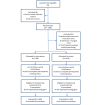Assessment of the Effectiveness and Cost-Effectiveness of Tailored Web- and Text-Based Smoking Cessation Support in Primary Care (iQuit in Practice II): Protocol for a Randomized Controlled Trial
- PMID: 32673255
- PMCID: PMC7388034
- DOI: 10.2196/17160
Assessment of the Effectiveness and Cost-Effectiveness of Tailored Web- and Text-Based Smoking Cessation Support in Primary Care (iQuit in Practice II): Protocol for a Randomized Controlled Trial
Abstract
Background: The prevalence of smoking is declining; however, it continues to be a major public health burden. In England, primary care is the health setting that provides smoking cessation support to most smokers. However, this setting has one of the lowest success rates. The iQuit in practice intervention (iQuit) is a tailored web-based and text message intervention developed for use in primary care consultations as an adjunct to routine smoking cessation support with the aim of increasing success rates. iQuit has demonstrated feasibility, acceptability, and potential effectiveness.
Objective: This definitive trial aims to determine the effectiveness and cost-effectiveness of iQuit when used as an adjunct to the usual support provided to patients who wish to quit smoking, compared with usual care alone.
Methods: The iQuit in Practice II trial is a two-arm, parallel-group, randomized controlled trial (RCT) with a 1:1 individual allocation comparing usual care (ie, pharmacotherapy combined with multisession behavioral support)-the control-with usual care plus iQuit-the intervention. Participants were recruited through primary care clinics and talked to a smoking cessation advisor. Participants were randomized during the initial consultation, and those allocated to the intervention group received a tailored advice report and 90 days of text messaging in addition to the standard support provided to all patients.
Results: The primary outcome is self-reported prolonged abstinence biochemically verified using saliva cotinine at 6 months after the quit date. A sample size of 1700 participants, with 850 per arm, would yield 90% power to detect a 4.3% difference in validated quit rates between the groups at the two-sided 5% level of significance. The Cambridge East Research Ethics Committee approved the study in February 2016, and funding for the study was granted from May 2016. In total, 1671 participants were recruited between August 2016 and July 2019. Follow-up for all participants was completed in January 2020. Data analysis will begin in the summer of 2020.
Conclusions: iQuit in Practice II is a definitive, pragmatic RCT assessing whether a digital intervention can augment the impact of routine smoking cessation support in primary care. Previous research has found good acceptability and feasibility for delivering iQuit among smoking cessation advisors working in primary care. If demonstrated to be cost-effective, iQuit could be delivered across primary care and other settings, such as community pharmacies. The potential benefit would likely be highest where less behavioral support is delivered.
Trial registration: International Standard Randomized Controlled Trial Number (ISRCTN): 44559004; http://www.isrctn.com /ISRCTN44559004.
International registered report identifier (irrid): DERR1-10.2196/17160.
Keywords: adults; internet-based intervention; primary care; smokers; smoking cessation; text messaging; tobacco.
©Joanna Proctor, Felix Naughton, Melanie Sloan, Sarah Hopewell, James Brimicombe, A Toby Prevost, Edward C F Wilson, Tim Coleman, Stephen Sutton. Originally published in JMIR Research Protocols (http://www.researchprotocols.org), 14.07.2020.
Conflict of interest statement
Conflicts of Interest: None declared.
References
-
- Government of UK. 2017. Jul 18, [2020-03-09]. Cost of Smoking to the NHS in England: 2015 https://www.gov.uk/government/publications/cost-of-smoking-to-the-nhs-in....
-
- NHS Digital. 2019. [2020-03-09]. Statistics on Smoking, England - 2019 https://digital.nhs.uk/data-and-information/publications/statistical/sta....
-
- Office for National Statistics. 2017. [2020-03-09]. Population Estimates: Analysis Tool https://www.ons.gov.uk/peoplepopulationandcommunity/populationandmigrati....
-
- Brown J, West R. Smoking In Britain Journal. 2017. [2018-12-07]. Quit Success Rates in England 2007-2017 http://www.smokinginbritain.co.uk/read-paper/draft/8/Quit%20success%20ra....
Grants and funding
LinkOut - more resources
Full Text Sources


